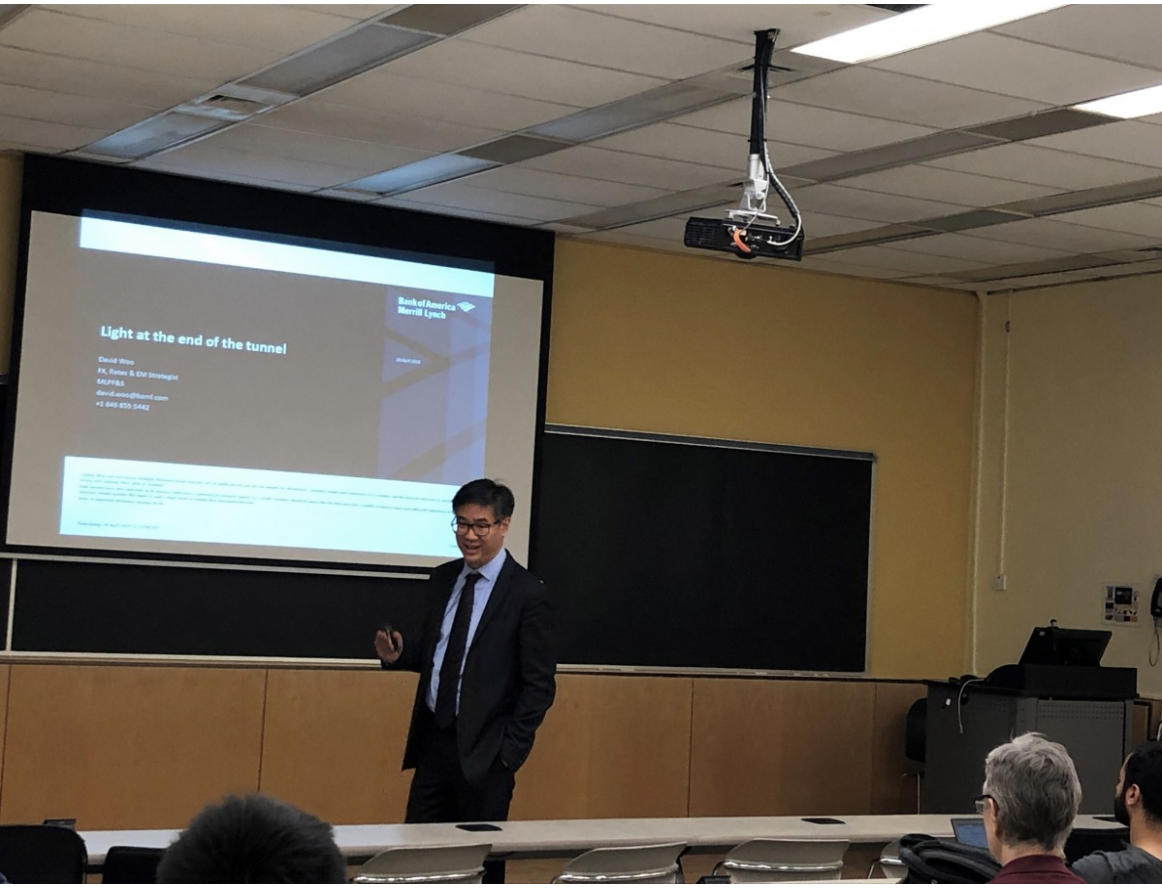On May 1st, the Center on Global Economic Governance at Columbia University hosted David Woo, head of Global Interest Rates, Foreign Exchange, Emerging Market Fixed Income and Macroeconomic Research at Bank of America. Woo, who obtained his PhD in Economics from Columbia University and is considered one of Wall Street’s top investment and macro strategists, manages a team of 50 analysts around the world.
Woo’s lecture at the School of International and Public Affairs focused on political uncertainty and risk, outlooks on the American and global economy, and the importance of understanding politics in order to make sound economic and financial decisions. Despite a year in which investors have been brooding over the risk of a recession, his lecture painted an optimistic picture of the American economy, citing both positive financial data and favorable political conditions.
In the past, recessions have been brought on by a confluence of factors including high debt leverage, asset bubbles and inflation. Despite the high household leverage exhibited before the onset of the 2008-09 Financial Crisis, including the housing market asset bubble, today there is no evidence indicating that the stock market is overvalued. Household leverage has actually been falling due to, among other factors, a generation of Millennials which favors the sharing economy, precipitating a decrease in the overall purchase of real assets. While government leverage, which is currently high in the United States, has had negative consequences in other countries, it has never brought about a recession within the American economy.
In the past, high inflation has also brought on recession by forcing the Central Bank to raise interest rates. Although the Federal Reserve had expected inflation to hover near 2%, it fell to 1.6% last month, allaying fears over an economic recession but conceivably anticipating a different kind of problem for the Central Bank. Further, while six out of the past seven recessions have been brought on by a spike in oil prices, a significant increase in U.S. oil production has not only given it the political leverage against Iran, on which it is leveraging economic sanctions, but provided it with significant profits and reserves, contributing to stable global oil prices.
As a leading Wall Street strategist, David Woo has had the opportunity to meet the heads of the biggest companies across the country to discuss their outlook on the private sector’s performance and future challenges. The most common variable that he has found across these private firm executives is political uncertainty. Unlike financial data, political uncertainty is difficult to measure yet it has the capacity to heavily weigh down an economy, most tangibly by overseeing a decrease in capital expenditure and investment.
Despite these fears, Woo expects political uncertainty to fall. In his view, the release of the long anticipated Mueller Report, whose results have been far from exhausted and fully comprehended, suggests the end of a long wave of uncertainty. Private firms are more focused on the 2020 election, which pit a financially conservative Republican party against an opposition whose financial policies and ideology have seen the most significant movement to the left in decades, including proposed reforms to corporate tax structures, debt relief initiatives and ambitious programs to mitigate the effects of climate change.
On the international level, there are promising signs for a US-China trade deal. Woo argues that, whereas many world leaders can afford to be short sighted, Xi Jinping, who has effectively eliminated term limits to his presidency, has strong pressure to work towards both a short and long-term economic plan for China, incentivizing him to push for a deal with the United States. In Europe, the extension of the Brexit deadline and internal negotiations point toward an eventual deal that will be softer and more favorable to European markets and the global economy.
While political uncertainty is always present, Woo believes that the major current sources of risk are falling, and that while we still live in a world that increasingly witnesses politics driving economics, and not the other way around, a combination of factors are leading the American and world economy toward a more favorable investment climate. Today’s political environment offers an important reminder that political risk is a critical determining factor to understand and take into account for economic and financial considerations.
David Woo is head of Global Rates, FX and EM Fixed Income Strategy & Economics Research at BofA Merrill Lynch Global Research. In this role, he is responsible for the bank’s views and forecasts for developed and emerging sovereign bond yields and exchange rates. Woo also serves as a member of the Research Executive Management Committee.
Woo joined BofA Merrill Lynch Global Research from Barclays Capital, where he served as head of Global Foreign Exchange Strategy for six years. Before joining Barclays, he spent four years at Citigroup as head of Local Markets Strategy for Europe, the Middle East and Africa. He began his career as an economist at the International Monetary Fund in Washington, D.C.
Woo has a B.A. in mathematics from Tufts University and a Ph.D. in economics from Columbia University.

